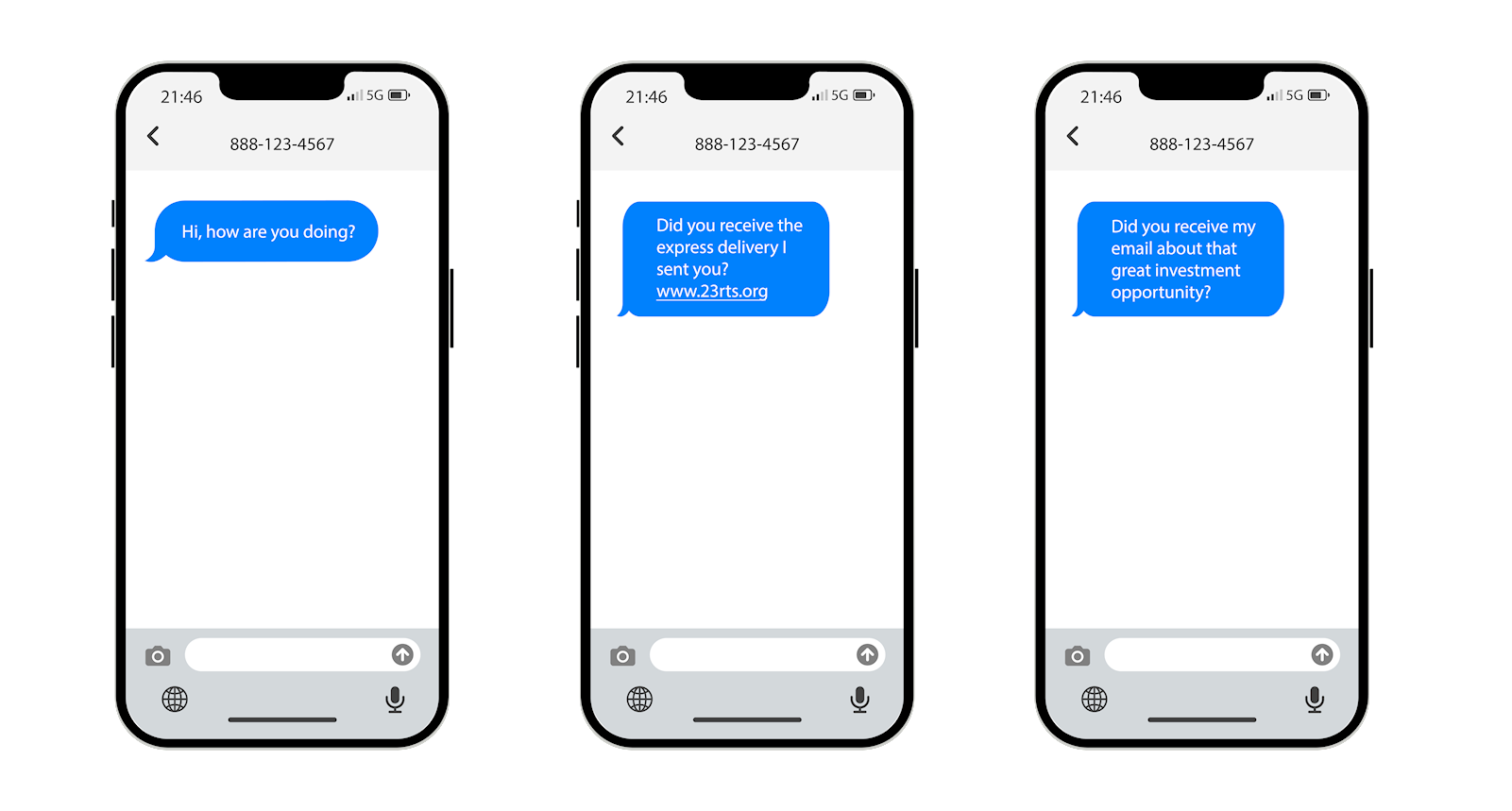Pig Butchering: An Apparent Mistake That Turns into Mayhem for Accountholders
posted by Mike Burke on Thursday, June 20, 2024 in SHAZAM Blog
Pig butchering. It’s a confidence and investment scam with a bloody name. The fraud refers to the practice of fattening a pig before slaughter. But in this case, the “pig” is a person who was gradually lured by scammers using elaborate storylines to gain their trust. Once this happens, the person is ready for “butchering” — meaning they’ll be bled dry of their money.
Let’s take a close look at how the scam starts and the tactics scammers use to fatten people up.
A single message that turns into mayhem
The scam starts off under false pretenses. A person receives a message from an unknown number. Their messages look something like these:

These messages appear like an innocent mistake. But make no mistake, it’s the first contact from a scammer.
Now, our first instinct may be to respond to these text messages as a courtesy to let the sender know they have texted the wrong person. DO NOT REPLY TO THEM. This is exactly what the scammer wants! Ghosting a scammer is not being rude; it is being smart.
If someone does reply to a scammer, they will often respond to apologize for sending the text message. Now that they’ve established contact, the scammer will continue to carefully craft follow-up text messages offering advice on investment opportunities often in the crypto currency space. This is where the fattening of the pig really starts.
If someone happens to “invest”, the scammer will show them impressive gains on their investment. The scammer may even allow the person to cash out their "profits” to further build their confidence and invest more money. This cycle continues until a person is unable or unwilling to pay more into the scam. This is when the scammer will abruptly cease communication with the victim, taking your money with them.
So now that you know how it works, let’s stop it and save you and your accountholder’s bacon.
Saving yourself from being butchered
IRS Criminal Investigation investigators warn that U.S. taxpayers are currently the most targeted population for pig butchering schemes. Additionally, the FBI reports seeing well over $3.5 billion in reported losses to these scams last year and it doesn’t seem to be slowing down in 2024. But there are ways you can save yourself and your accountholders from the chopping block.
Delete and don’t respond. If you get an unexpected message, just delete it. If you respond to the text message, even if you don’t get caught up in the scam nor lose any money, you are telling the scammer the number they sent the fraudulent text to is a real number. This puts you at risk of being targeted again.
Don’t click any links. Some of these unexpected text messages or messages may contain links to click on for further information. NEVER click on these links. Their bogus links may contain malware that could be installed on your device, giving the scammer access to your phone.
Say no to sending money as an “investment”. Think twice about sending money to an online romantic interest, especially if they are asking to send them a payment to them as an investment platform in cryptocurrency or their love interest guarantees profits or big returns if you invest with them.
If you or someone you know has fallen victim to this scam, don’t be embarrassed. Contact your financial institution and law enforcement to stop any further loss. You can also file a complaint on the FBI’s Internet Crime Complaint Center (IC3).
About the Author

Mike Burke is a veteran law enforcement professional with experience in criminal justice instruction, homeland security and fraud investigation. He guides SHAZAM clients to enhance their security measures and ensure regulatory compliance.
SHAZAM, Inc. and ITS, Inc. provide this blog for general informational purposes only. Our blog may be shared by a direct link wherein the content remains as originally presented and has not been altered. SHAZAM, Inc. and ITS, Inc. assume no responsibility for errors or omissions in the contents on the blog. By using this blog, reader agrees that the information published does not constitute nor is a substitute for legal advice which should only be sought from a qualified, licensed attorney.
Comments
comments powered by